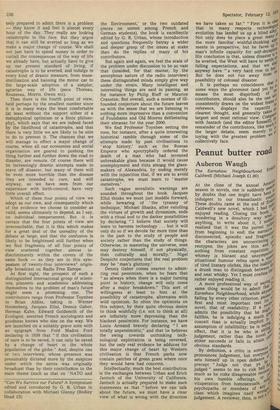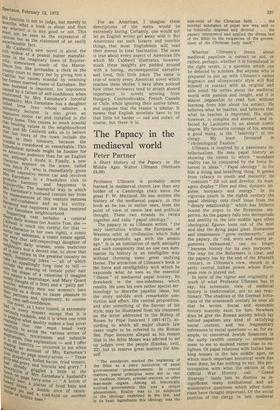Peanut butter road
The Earnshaw Neighbourhood Auberon Waugh ErsV The Earnshaw Neighbourhood Caldwell (Michael Joseph £1.90) At the close of the annual season in novels, one is suddenly ass"V by doubts that one might have beensio indulgent to our transatlantic These doubts came at the end of Er"„ttoi Caldwell's new novel, which I had r`opi enjoyed reading. Closing the book, t wondering in a desultory way Wb,,Eicie'r0 anything, to write about it, I realised that it was the purest from beginning to end: the narratt;ar, disconnected, episodic and fragile° 11r the characters are unconvincing, reotypes; the jokes are thin an' nothing from constant repetitiory whimsy is blatant and unsyniCatitobt situational humour relies upon a of tired literary clichés, like the inau""bee a drunk man to distinguish betWee°,1105 and neat whisky. Yet I must confess rather enjoyed reading it. a. 0 A more professional way of saY2ft° same thing would be to admit t',0911,, Earnshaw Neighbourhood, while abY'es failing by every other criterion, Par, 0,1 first and most important test 1°;ielt novel, that of readability. If a admits the possibility that he ni'vn,rekt`' ; fallible, he is indulging a much conceit than is actually implicit $,P, t assumption of infallibility: he is saYs effect, that it is he who is siti"s0' judgement, rather than the novel,ef7 either succeeds or fails to attain obvious standards. r
b b
By definition, a critic is sorne-ee pronounces judgement, but everYntiof!. 'D" sets himself up in open defiancebe r). precept "Judge not that ye judged " seems to me to risk le much as he risks disagreeable revt-pOt, his own humble offerings, °rdge; b; vituperation from homosexuals, psychopaths or members of a,%god, class which imagines itself vir";:a judgement. A reviewer, then, is 11°' His function is not to judge, but merely to describe what a book is about and then say whether it is any good or not. This Must not be seen as the expression o f opinion but as the statement of an easily ascertainable fact. Mr Caldwell's new novel is about the rich widow of a peanut butter manufacturer in the imaginary town of RoysterVille, somewhere south of the Masonbixon line. She persuades a clerk in the county court to marry her by giving him a Cadillac but causes scandal by retaining her former married name of Earnshaw. Her new husband is impotent, his impotence caused by a failure of self-confidence when echfronted by Mrs Earnshaw's forceful Personality. Mrs Earnshaw has a daughter called Irma Jean whose admirer, a university lecturer, is also given an expensive motor car and installed in the farnilY home. This causes so much scandal that housing values in the neighbourhood ,cIPP, and Mr Caldwell asks us to believe mat has tours of the town include the house in their itinerary, because the scandal is considered so remarkable. This nYPerbolical episode might be funnier for an American audience than for an English cne, although I doubt it. Finally, a new jcharacter appears on the scene, called :)411 Arnix IV, who is immediately given 17‘111°ther expensive motor car and involves Zrs Earnshaw in a fraudulent club to ,°1"ncite harmony and happiness in %..aYsterville. The masterful way in which aars r the '-arnshaw's husband rescues her from N:u4ccnsequences of this ventuie restores self-confidence and so his virility. toal:Pn, crkY and happiness are thus restored Earnshaw neighbourhood. carPPorting cast includes a comical ° daily woman (no Auntie Tom, she — batclwell is much too careful for that — niata character in her own right), a comic the Or car salesman, a comic estate agent, the xtexY (but self-respecting) daughter of riej 'Negro daily woman, some malicious all °b°11rs and a decent one, to show that eart'sh not rotten in the greatest country on take SuPporting jokes — all of which inekman aPpallingly long time to tell T into the shaving of female pubic hair this rr`,"e shape of a valentine (I imagine sureiT„eans a heartshape, and Mary Quant, routiJ thought of it first) and a 'patty pat butt,c";17: whereby men use women's bare theiras a drum to cause pleasure to their Partners and, apparently, to restore owh self-confidence. baatile novel, as I have hinted, is extremely curiohill, every respect except that it is to TY readable, and it is when one tries read'a,tYse What quality makes a bad novel carefabilie that one must tread 'very sahjell„',3' to avoid the various errors of dogrn":,visni, revisionism and infantile it in a`,Istn. One explanation — and I offer readinall humility occurred to me when brew g an account of Mrs Earnshaw's Kfast on page ninety-seven Pink— "Texas r grits_a%aPefruit, boiled bacon, fried tomato, had ,","`-gravY and biscuits .aireacb, and gravy." I ,:scro J goggled a little at the tUrich 0 n of Mrs Earnshaw's husband's Schlitz LI, Page forty-nine "A bottle of baked beer a platter of fried ham and %stard earls, a double slice of raisinbottle of PSiechalint beer." d a z cold-hold on another For an American, I imagine these descriptions of the menu would be extremely boring. Certainly, one would not let an English writer get away with it. But Americans eat such bizarre and horrible things, that most Englishmen will read their menus in total fascination. The same is true about every aspect of American life which Mr Caldwell illustrates, however much these insights are padded around with a boring, inconsequential narrative and tired, thin little jokes. The same is true of nearly every American novel which reaches these shores. I have often noticed how other reviewers tend to attach absurd importance to novels arriving from Hungary, Czechoslovakia, French Canada or Chile, while ignoring their native talent, and suppose that the reason is similar. It means that English novelists have to try that little bit harder — sad and unfair, of course, but there it is.











































 Previous page
Previous page